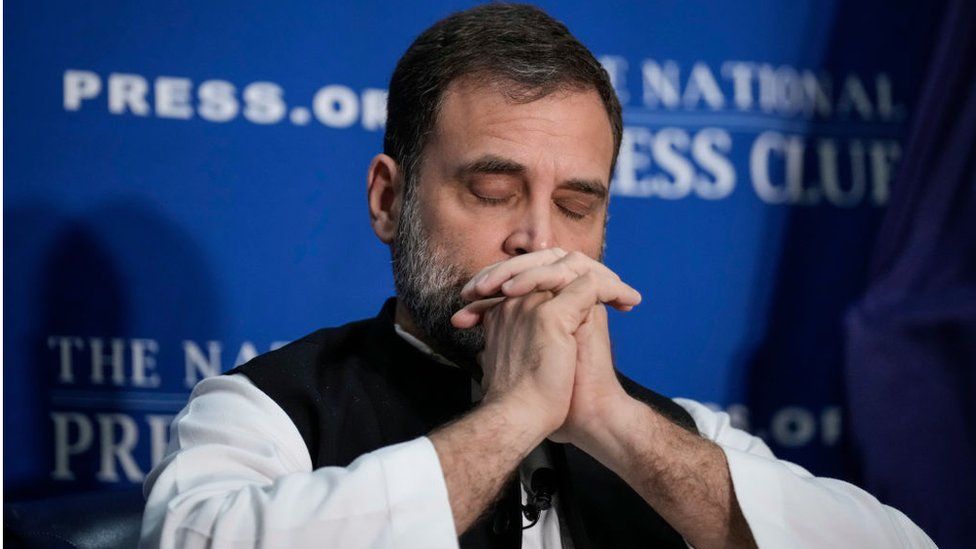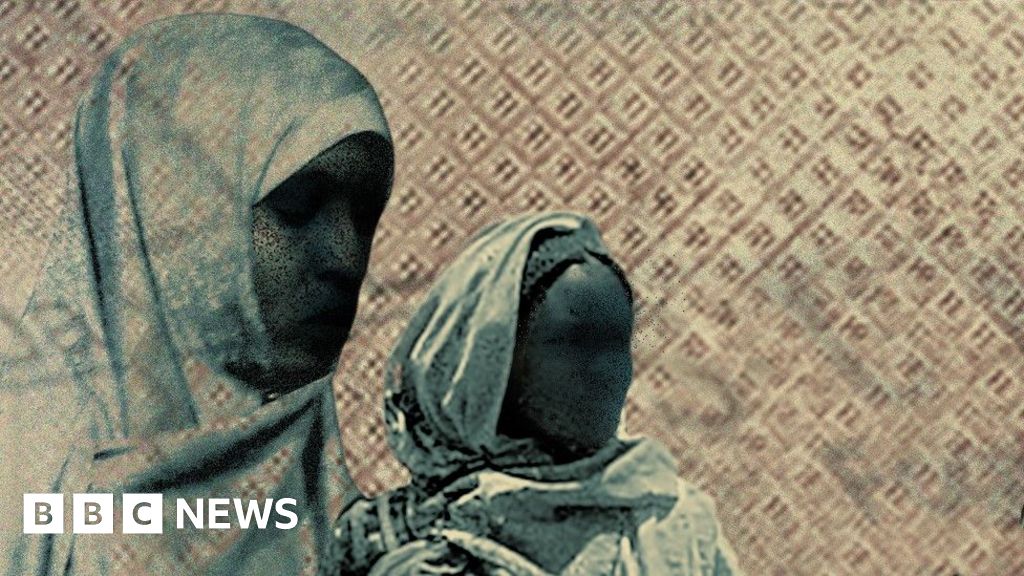ARTICLE AD BOX
 Image source, Getty Images
Image source, Getty Images
Rahul Gandhi is often seen as the face of the opposition alliance against the BJP
How fair is the electoral landscape in India's general election?
Not very, says the opposition alliance. It accuses the Narendra Modi-led Bharatiya Janata Party (BJP) government of denying it a level playing-field.
The BJP, seeking a third consecutive term, is ahead in opinion polls, and the opposition, which has been short of vote-winning national leaders in recent years, appears to have much ground to make up.
Formed last July and made up of the main opposition Congress and smaller and regional parties, the coalition named itself INDIA, an acronym for Indian National Developmental Inclusive Alliance. Its more than two dozen members are an unlikely, unwieldy grouping brought together by their desire to unseat the BJP.
The opposition alleges the government is using its investigative agencies and financial influence to gain the upper hand. Mr Modi dismisses such claims as mere "excuses".
Fuelling these accusations are recent arrests of key opposition figures, such as Delhi Chief Minister Arvind Kejriwal and former chief minister Hemant Soren of Jharkhand State on corruption charges they say are baseless and politically motivated.
Mr Kejriwal, one of the government's fiercest critics, was taken into custody a month before the election began, depriving the opposition alliance of one of its most prominent and popular campaigners.
Since the BJP came to power a decade ago, more than 100 politicians have been investigated by India's federal agencies - 95% of them from the opposition, the Indian Express reports. The paper finds that many later switched allegiance to the BJP. Of 25 opposition leaders under investigation for corruption who did so, 23 saw cases against them dropped or put on hold, it reports.
Image source, Getty Images
Image caption,Trinamool Congress Party leader Mamata Banerjee is a key opposition leader in West Bengal state
That's not all. In February, Congress leaders alleged that the party's bank accounts had been frozen and accused Mr Modi's government of using the tax department to starve them of finances ahead of the elections. The tax department denied the claims.
In December more than 140 federal opposition lawmakers were briefly suspended from parliament during protests over a security breach.
The same month, Mahua Moitra, an opposition MP and Modi critic, was expelled from parliament after being accused of taking bribes in exchange for asking questions. Ms Moitra, who has denied the allegations, said she had been expelled "without proof" and is standing for re-election in West Bengal state.
Last summer Congress leader Rahul Gandhi was disqualified as a lawmaker for three months in a criminal defamation case. The courts stayed his conviction on appeal.
"The idea that India is the world's largest democracy is a… complete lie," Mr Gandhi told journalists in March at a news conference to publicise the party's frozen bank accounts. The BJP responded, saying the Congress top leadership feared "a historic defeat" and therefore "ranted against Indian democracy and institutions".
Rights group Amnesty International said the "crackdown" on the opposition had reached a "crisis point" ahead of the general election.
Journalist and author Neerja Chowdhury questioned the fairness of freezing the Congress's bank account and arresting Mr Kejriwal on the eve of the election.
"It does give the impression that you are less than fair. There is a feeling or a question among people, including BJP supporters: is this getting too much? It will be interesting to see how this would manifest in the polls," she said.
Image source, AFP
Image caption,MK Stalin of the opposition DMK party rules over the southern state of Tamil Nadu
Added to this, Congress, which governed India for decades, looks enfeebled and in decline. Mr Modi's BJP governs 12 of the country's 28 states, while Congress is now limited to three.
For years Congress consistently secured more than 40% of total votes, before dipping below 40% in 1989 and plunging to around 20% in 2014 and 2019. In recent years, several top leaders have defected from the party.
Critics fault Mr Gandhi, the face of the party, for lacking the relentless campaigning of Prime Minister Modi, who frequently traverses the nation, addressing crowds and inaugurating projects worth millions of dollars. The latest criticism arose when Mr Gandhi initiated a months-long march as the election neared.
"This was the time to be in Delhi, finalise talks and strategies with coalition partners, not to start a new project," says Analyst Prem Kumar Mani.
Congress leaders rejected the criticism, arguing that Mr Gandhi was always accessible via mobile. "It's not that we take things non-seriously, but it's presented as if we are non-serious," said senior Congress official Shakeel Ahmed Khan.
Image source, Getty Images
Image caption,The opposition alliance INDIA includes parties with conflicting interests and ideologies
Political scientist KC Suri has attributed the Congress' decline to it becoming a "playground for political entrepreneurs, factions, and wily political satraps" in their relentless "pursuit of power and wealth".
The INDIA alliance has also faced wider criticism that it is not offering a credible alternative and a competitive narrative, and lacks a charismatic national leader.
The group includes parties with conflicting interests and ideologies, which delayed joint public appearances and hindered the creation of a joint manifesto. Maintaining unity has been challenging for the alliance.
The Congress faced setbacks in 2022 when Maharashtra state's coalition government was overthrown by rebels from its coalition partner Shiv Sena, who then formed a new government with the BJP. Another coalition partner in the state, the NCP, also suffered factional divisions.
More recently two of the INDIA coalition's initial members - the Janata Dal (United) and Rashtriya Lok Dal - switched sides to join the BJP's NDA alliance.
"In case of split in the parties, questions should not be asked of those who quit but of the leaders who couldn't prevent a split," said BJP MP Navneet Rana.
Opposition parties have also struggled to negotiate seat-sharing agreements to field unified candidates nationwide against the BJP.
In West Bengal, for example, the governing Trinamool Congress opted not to share seats, prompting its INDIA alliance partners to field their own candidates. Many fear this could divide opposition votes in a politically crucial state, where the BJP has been trying hard to make inroads.
"There is a continuing tension inherent in coalition-building between the national and state outcome," said political scientist Milan Vaishnav.
"There are parties in particular states, like Bengal, who are unwilling to sacrifice their regional standing for the sake of better national outcomes because they are very worried about ceding space in their own territory."
Image source, Getty Images
Image caption,There have been protests against Arvind Kejriwal's arrest in a corruption case
Mr Suri writes that non-BJP parties have portrayed themselves as regional advocates but often devolve into family-run entities, marked by "corruption and poor governance".
Some opposition leaders and supporters fear the consequences if the opposition loses. They warn of a decline in democracy and civil liberties, with government institutions being undermined and a rise in hate and violence against minorities and marginalised communities under Mr Modi. The BJP dismisses these allegations.
But some caution the opposition against losing hope.
"The opposition is making a big strategic blunder if it says there is no tomorrow," said Prashant Kishore, a former election strategist.
"The BJP wants us to believe there is no tomorrow after 2024. If I were in their place, I will say we will fight with all the strength, but if we end up losing, there is a tomorrow after the 2024 polls."

 9 months ago
40
9 months ago
40








 English (US) ·
English (US) ·